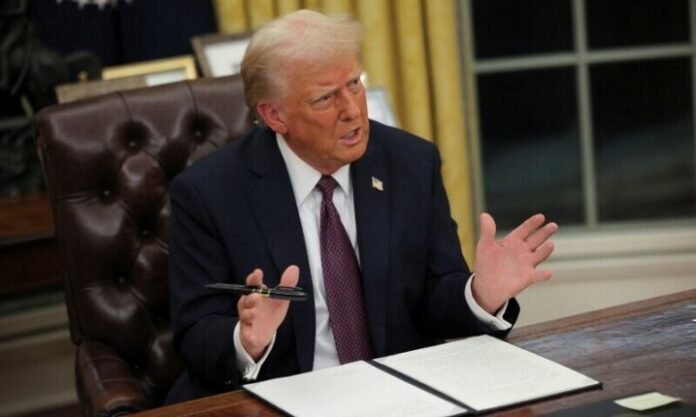Washington: (Reuters) – On his first full day back in office, U.S. President Donald Trump signed a series of executive orders and directives aimed at reshaping key policies on immigration, climate, federal employment, and law enforcement. The orders mark a sharp departure from the previous administration’s policies and reinforce Trump’s campaign promises to reverse Biden-era initiatives.
Mass Pardons for January 6 Defendants
In a sweeping gesture, Trump issued pardons for approximately 1,500 individuals convicted in connection with the January 6, 2021, attack on the U.S. Capitol. Among those granted clemency were 14 members of far-right groups, including the Proud Boys and Oath Keepers, some of whom had been convicted of seditious conspiracy.
“We hope they come out tonight, frankly,” Trump said. “We’re expecting it.”
The executive action also instructs the U.S. Attorney General to drop all pending cases related to the Capitol riot, a move likely to draw legal and political challenges.
Crackdown on Immigration
Trump declared illegal immigration at the U.S.-Mexico border a national emergency, designated criminal cartels as terrorist organizations, and signed an order targeting automatic citizenship for U.S.-born children of undocumented immigrants.
Another directive suspends the U.S. refugee resettlement program for at least four months and calls for a security review to determine if travel bans should be reinstated for certain countries.
“The United States lacks the ability to absorb large numbers of migrants,” the order states.
Reversing Biden’s Policies
At a rally in Washington, Trump announced the revocation of 78 executive actions implemented during Joe Biden’s presidency. These include measures related to clean energy, diversity and inclusion, pandemic relief, and consumer protections.
“I’ll revoke nearly 80 destructive and radical executive actions of the previous administration,” Trump said.
He also signed an order requiring all federal agencies to preserve records related to what he described as “political persecutions” under the Biden administration.
Rollback of Diversity and Inclusion Initiatives
Fulfilling a campaign promise, Trump rescinded executive orders promoting diversity, equity, and inclusion (DEI) and protections for LGBTQ+ rights and racial minorities. The move eliminates at least a dozen Biden-era measures aimed at combating discrimination.
Temporary Reprieve for TikTok
Trump signed an order delaying by 75 days a ban on the popular social media platform TikTok, which had been slated for shutdown on January 19. The order directs the Attorney General to review the matter before further action is taken.
Federal Hiring and Regulatory Freezes
Trump reinstated a federal hiring freeze and ordered all government employees to return to full-time, in-person work, effectively ending widespread remote work arrangements.
“I will implement an immediate regulation freeze, which will stop Biden bureaucrats from continuing to regulate,” Trump said.
Some Trump allies have suggested the move is aimed at reshaping the civil service, potentially making it easier to replace career government employees with political appointees.
Inflation and Economic Policies
The president directed all federal agencies to take emergency measures to combat inflation, including cutting regulations that could increase costs and expanding housing supply to lower prices.
“Over the past four years, the Biden Administration’s destructive policies inflicted a historic inflation crisis on the American people,” the order states.
Withdrawal from the Paris Climate Accord
Trump formally withdrew the United States from the Paris climate agreement, arguing that the accord placed unfair economic burdens on American industries. He also revoked a 2023 executive order restricting oil drilling in parts of the Arctic and scrapped regulations promoting electric vehicle (EV) adoption.
“It is the policy of my administration to put the interests of the United States and the American people first,” the order states.
Exit from the World Health Organization
Trump also announced the U.S. withdrawal from the World Health Organization (WHO), citing its handling of the COVID-19 pandemic and other global health crises. He has nominated vaccine skeptic Robert F. Kennedy Jr. to lead the Department of Health and Human Services.
Government Restructuring and ‘Deep State’ Investigation
Trump established a new advisory group called the Department of Government Efficiency (DOGE), led by Tesla CEO Elon Musk, tasked with cutting federal agencies and reducing the number of government employees.
Another executive order directs the Attorney General to investigate what Trump described as the “weaponization” of federal agencies under the previous administration, including the Department of Justice, the Securities and Exchange Commission, and the Federal Trade Commission.
Free Speech and Censorship
Trump signed an order aimed at restricting federal oversight of online content moderation, arguing that government agencies had infringed on free speech under the guise of combating misinformation.
Energy Policies and National Security
Declaring a “national energy emergency,” Trump outlined plans to expand domestic oil and gas production, reverse Biden-era climate policies, and eliminate leasing programs for offshore wind energy projects.
“We will unleash American energy dominance,” Trump said, emphasizing that his administration will work to lower consumer energy prices and prioritize fossil fuel production.
Political Fallout and Legal Challenges
The executive orders, which represent a sweeping shift in federal policy, are expected to face significant legal and congressional opposition. Democrats and advocacy groups have already vowed to challenge several of Trump’s actions in court.
As Trump embarks on his second term, the impact of these measures is likely to define the political landscape in the coming months.




